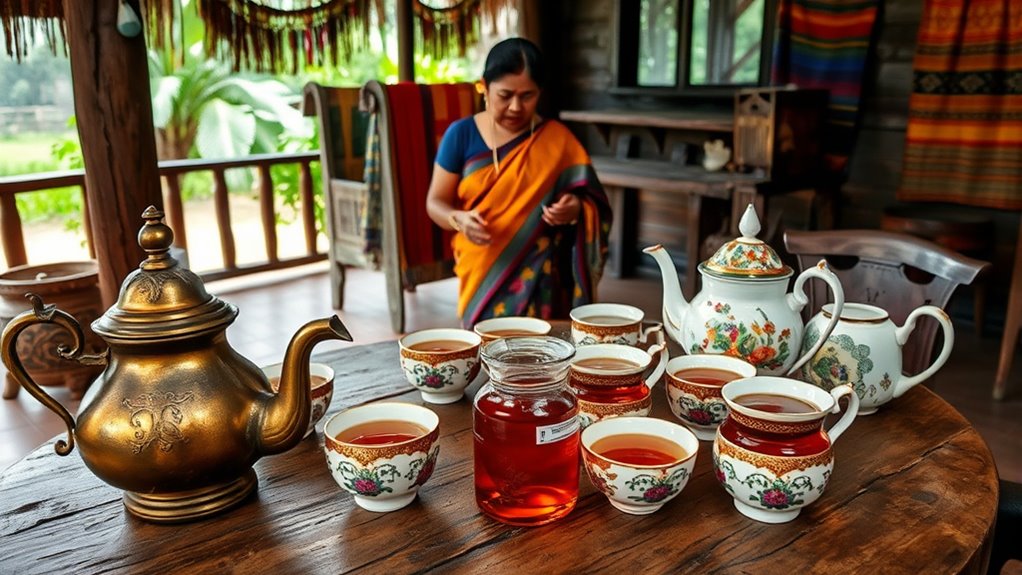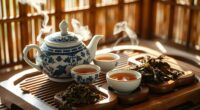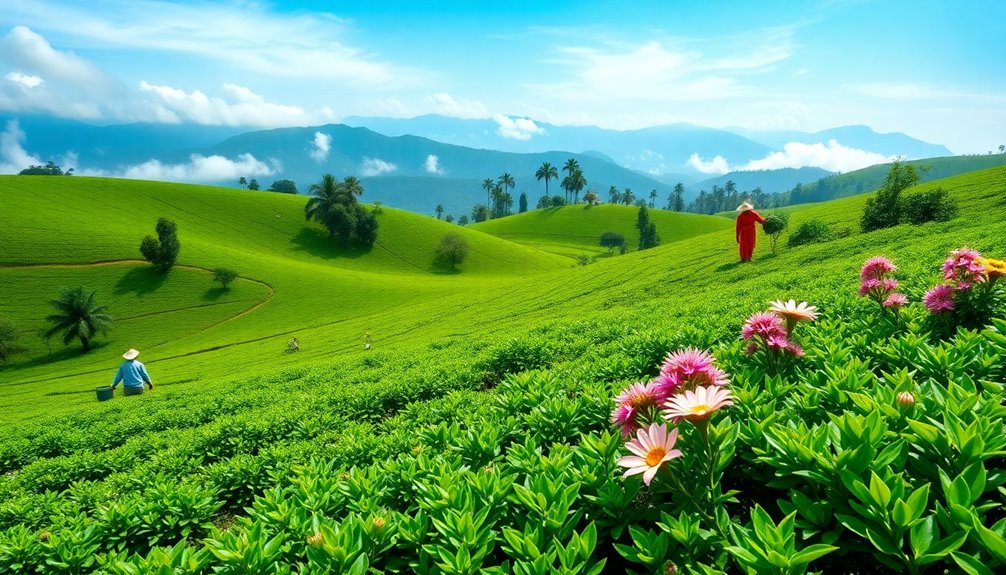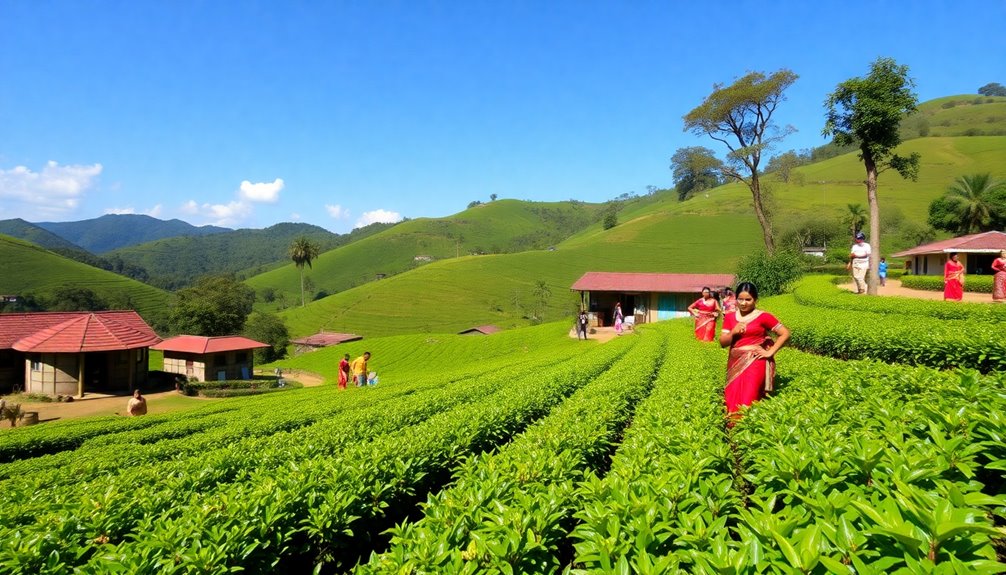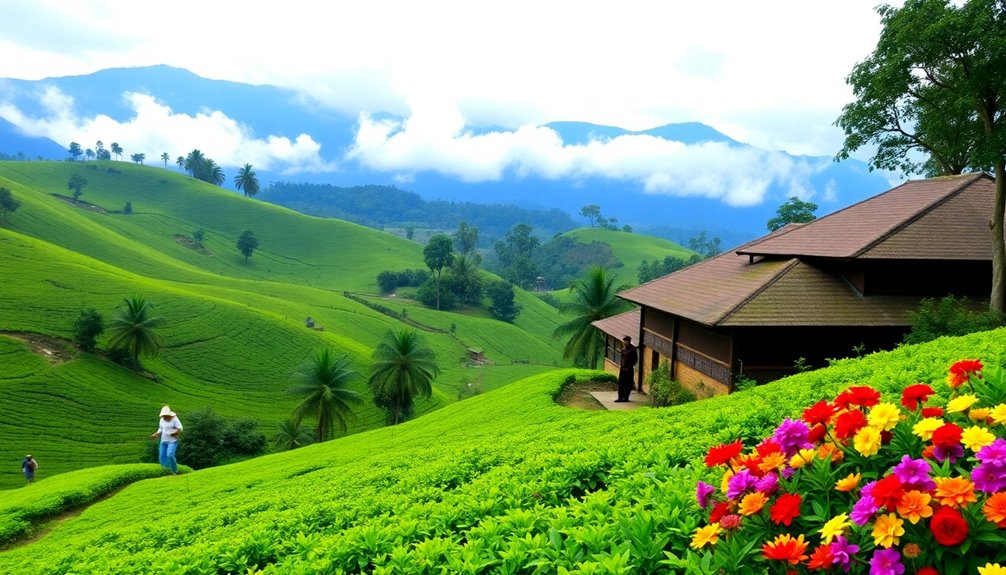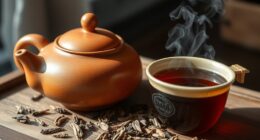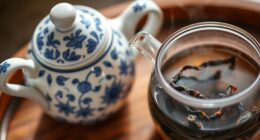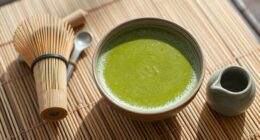Sri Lankan tea holds a deep cultural significance, symbolizing hospitality, respect, and community bonds. It’s more than just a beverage; it’s part of tea ceremonies, family gatherings, and celebrations that reflect traditions passed down through generations. Offering tea to guests shows warmth, while special rituals during festivals highlight its importance in local life. To understand how tea connects people and preserves cultural identity, explore the rich customs behind it further.
Key Takeaways
- Tea symbolizes respect, hospitality, and community bonding, reflecting Sri Lanka’s rich cultural identity.
- Traditional tea ceremonies during festivals and family gatherings emphasize respect and cultural continuity.
- Offering tea during social visits fosters relationships and demonstrates warmth and hospitality.
- Tea acts as a ceremonial act during religious festivals, symbolizing blessings and positive wishes.
- High-quality Sri Lankan tea enhances its ceremonial importance and underscores cultural values.

Sri Lankan tea is more than just a popular beverage; it’s an integral part of the country’s rich cultural heritage. When you visit Sri Lanka, you’ll notice that tea isn’t just something to drink—it plays an essential role in various cultural rituals and social interactions. Tea ceremonies, while simpler than those in some other Asian cultures, hold a special place in local traditions. These ceremonies are more than just about preparing and serving tea; they symbolize respect, hospitality, and community bonding. During festive occasions or family gatherings, you might be invited to participate in a tea ritual, where the way tea is prepared and served reflects the host’s care and thoughtfulness. The act of pouring tea with precision and grace becomes a gesture of warmth and welcome, emphasizing the importance of connection and tradition.
In Sri Lankan culture, tea ceremonies are often intertwined with daily life and major celebrations. For example, during religious festivals or family milestones like weddings, serving tea becomes a ceremonial act that signifies good wishes and blessings. It’s common to see elders offering tea to younger family members or guests, reinforcing respect and social hierarchy through this simple yet meaningful gesture. These rituals often involve specific customs, such as using particular cups or serving tea at certain times, which have been passed down through generations. In this way, tea becomes a vessel for cultural continuity, linking the present with the past. Additionally, the vetted quality of Sri Lankan tea enhances its significance in traditional rituals, highlighting its esteemed status in local culture.
Beyond formal ceremonies, tea also plays an indispensable role in everyday cultural rituals. You’ll find that offering a cup of tea to visitors is a universal sign of hospitality, reflecting Sri Lanka’s warm and welcoming spirit. Serving tea in the morning or during social visits isn’t just about refreshment; it’s a way to foster conversation and strengthen relationships. In rural communities, sharing a cup of tea often marks the beginning of a day’s work or a communal gathering, emphasizing the importance of social bonds. Even in urban settings, tea is central to informal meetings, where it acts as a bridge connecting people and facilitating dialogue.
Frequently Asked Questions
How Has Sri Lankan Tea Influenced National Identity?
You see, Sri Lankan tea has shaped national identity by becoming a symbol of resilience and pride. The tea industry’s growth reflects the country’s economic strength, while the cultural symbolism of tea fosters unity among locals. When you sip on Ceylon tea, you connect with a rich heritage that embodies perseverance and tradition. This shared experience helps reinforce a sense of belonging and national pride.
What Are Common Tea-Related Rituals in Sri Lankan Festivals?
During Sri Lankan festivals, you participate in a tea ceremony that highlights ritualistic brewing, emphasizing respect and tradition. You might observe elders performing specific steps, like pouring tea with a steady hand or sharing cups to symbolize unity. These rituals create a sense of community and continuity, reinforcing cultural values. Engaging in these tea-related customs allows you to connect deeply with local traditions and appreciate the symbolic importance of tea in celebrations.
How Do Different Regions Incorporate Tea Into Their Customs?
You’ll find that each region weaves tea into its customs like a well-placed thread in a tapestry. In the hill country, regional brewing techniques highlight unique flavors during ceremonial practices, while coastal areas incorporate tea into community gatherings, emphasizing hospitality. These customs reflect local history and tastes, making tea a symbol of unity and tradition. No matter where you go, tea’s role tells a story of shared identity and cultural pride.
Are There Specific Sri Lankan Tea Varieties Linked to Traditions?
Yes, certain Sri Lankan tea varieties are linked to traditions, like heritage blends and ceremonial infusions. You’ll find that some teas are specially crafted for rituals or celebrations, symbolizing cultural pride and history. When you partake in these, you’re experiencing more than just a drink — you’re connecting with centuries of tradition. These unique blends preserve the island’s rich heritage, making each cup a meaningful part of local customs.
How Has Tea Shaped Social Interactions in Sri Lankan Communities?
Imagine the warm aroma of freshly brewed Sri Lankan tea filling a cozy room, bringing people together. You see tea and community bonding flourish as friends and families gather, sharing stories over steaming cups. The tea ceremony etiquette guides respectful interactions, strengthening relationships. Through these moments, tea becomes more than a beverage; it’s a symbol of unity, fostering trust and warmth in every sip, creating lasting social connections.
Conclusion
So, next time you sip that warm cup of Sri Lankan tea, remember you’re part of a story centuries in the making. Its rich aroma isn’t just a flavor—it’s woven into the very fabric of local traditions, waiting to reveal more. What other secrets does this ancient brew hold? Keep exploring, because the deeper you go, the more surprises you’ll uncover. Your journey with Sri Lankan tea is just beginning—are you ready to discover what’s next?

